How Australian women roared and held leaders to account in 2021
From Grace Tame’s spine-tingling Australian of the Year speech to Brittany Higgins, Sue Clarke and Kate Jenkins driving change, a throng of strong women raised their voices in 2021, resulting in politicians delivering awkward and cringe-worthy responses. Journalist SHERELE MOODY reflects on the year women roared.
Logan
Don't miss out on the headlines from Logan. Followed categories will be added to My News.
OPINION: From Grace Tame’s spine-tingling Australian of the Year speech to Brittany Higgins, Sue Clarke and Kate Jenkins driving change, a throng of strong women raised their voices in 2021. Journalist SHERELE MOODY reflects on the year women roared.
2021 is the year Australian women roared.
It’s the year we found our collective voices, screaming enough’s enough and making it clear that we will no longer stand idly by on the issues of harassment, sexual assault, intimate partner violence, systems abuse, inequality and under-representation in politics, business and sports.
From Grace Tame and Brittany Higgins to unsung heroes like anti-domestic violence fighters Sue Clarke and Lee Little, women’s voices rising to the top, they are strong and they will not be silenced.
And they are making powerful men squirm.
In 2021, our nation’s leader Scott Morrison found himself under constant pressure on women’s rights and gendered violence.
In February, after Brittany Higgins alleged she was raped in Parliament House and the Government failed in its handling of the complaint, Mr Morrison proclaimed his wife Jenny’s words caused him to take action.
“Jenny and I spoke last night, and she said to me, ‘You have to think about this as a father first. What would you want to happen if it were our girls?’” he said during a press conference.
“Jenny has a way of clarifying things. Always has.”
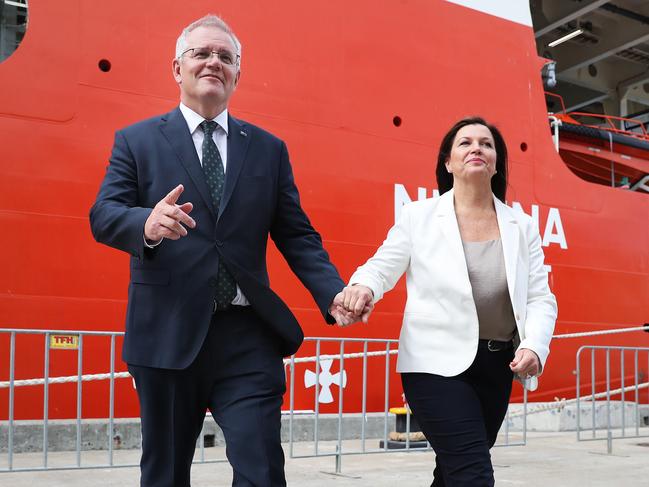
In March, Morrison declared women protestors should consider themselves lucky they weren’t met with guns when hundreds of thousands of us rose up against the patriarchy during the Women’s March 4 Justice Rallies across the country.
“Not far from here, such marches, even now are being met with bullets, but not here in this country,” Mr Morrison told Parliament that day.
Ironically, the marches were a protest against gendered violence.
It wasn’t just ScoMo feeling the heat.
Controversial NSW MP Mark Latham was skewered across social media for comments he made about reigning Aussie of the Year Grace Tame.
He claimed Tame had ‘disgraced’ the role by being ‘too divisive’.
“(The) Australian of the Year says the Prime Minister has a corrupt standard. This is the new normal in the way Grace Tame has disgraced her role,’ Latham said Tweeted on December 3.
Tame’s response? “Thanks Real Mark. Framing this.”
Around 10,000 Twitter users liked Tame’s burn compared to a measly 43 liking Latham’s.
Meanwhile, the appointment of Barnaby Joyce to a taskforce aimed at improving the treatment of women was labelled a “terrible joke”.
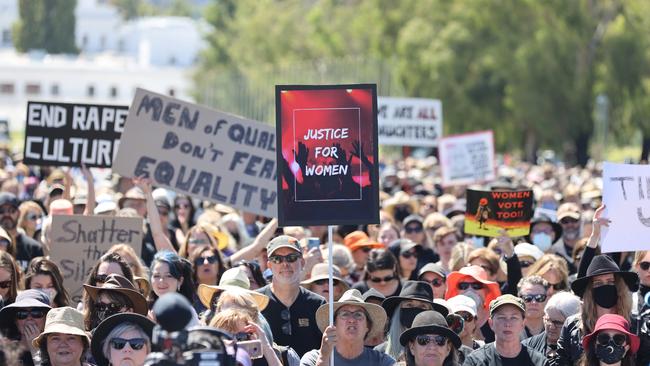
Joyce resigned as Deputy PM in 2018 after it came to life that he was expecting a child with a staffer as a result of an extramarital affair.
After Joyce took the role on the taskforce, Labor senator Kristina Keneally said: “This is a terrible joke Mr Morrison is playing on Australian women.”
“No wonder thousands of women marched on parliament to say enough is enough,” she said.
“Mr Morrison didn’t even have the decency to come out and meet them.”
Australia’s so-called ‘women’s issues’ were far from solved in 2021.
We still have women facing inequality across a range of areas including pay, housework duties, superannuation and representation on boards and in state and federal parliaments.
Sex assaults, rape, intimate partner abuse and other forms of gendered violence are far from reducing and we are still losing at least one woman to an act of murder or manslaughter every week to 10 days. By my count, 46 Australian women have been killed this year - almost all by men and at the hands of current or former partners.
While there are more women bravely stepping into the spotlight to tell their stories in order to ignite change, Australia is far from being an equal society.
These are just some of the women we need to thank for stepping into the spotlight for the greater good of us all.
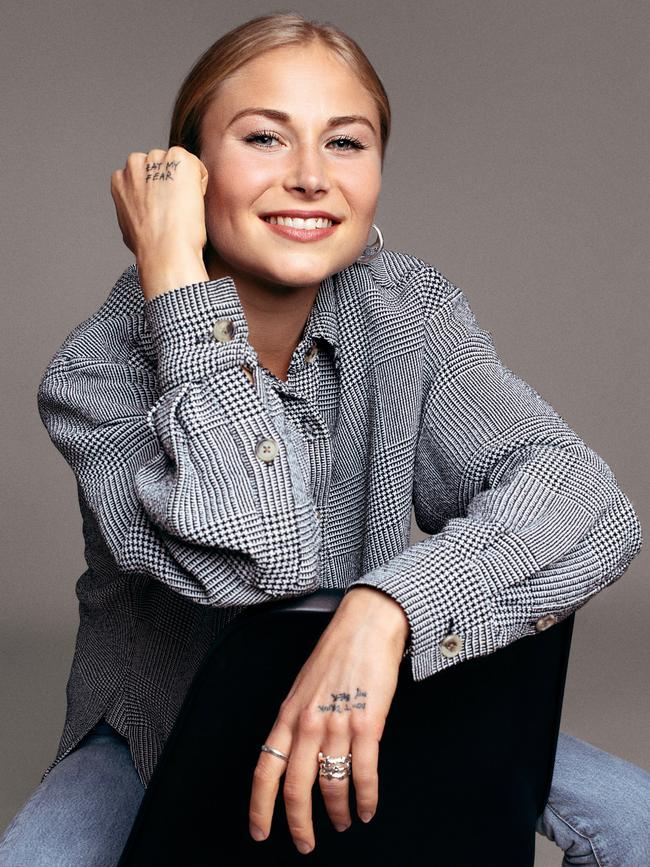
GRACE TAME
In January, the indomitable Grace Tame accepted the title of Australian of the Year.
You could almost hear women across the country applauding, as the young warrior queen from Tasmania urged the country to ‘hear me now’.
The award recognised her advocacy as a survivor of child sex abuse. It also honoured her role in ensuring Tasmanian rape and sexual violence victims would no longer be silenced by laws that denied them the right to identify themselves as survivors and to tell their stories.
“All survivors of child sexual abuse, this is for us,” Tame said in her acceptance speech.
“I lost my virginity to a paedophile. I was 15, anorexic; he was 58, he was my teacher.
“For months he groomed me and then abused me almost every day. Before school, after school, in my uniform, on the floor.
“I didn’t know who I was.
“Publicly he described his crimes as ‘awesome’ and ‘enviable’. Publicly I was silenced by law. Not anymore.
“Australia, we’ve come a long way but there’s still more work to do in a lot of areas.”
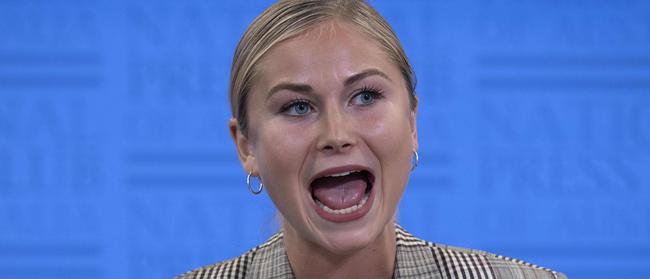
Tame’s speech was emotional and powerful - the kind of moment that hits you in the feels, crating goosebumps across your whole body. It was a moment that left many of us in tears.
Tame’s speech was also the cherry on the top of an incredible line-up of heroins, who made the 2021 Australian of the Year Awards the best in our nation’s history.
Instead of being dominated by men receiving recognition, this year’s national gongs all went to women.
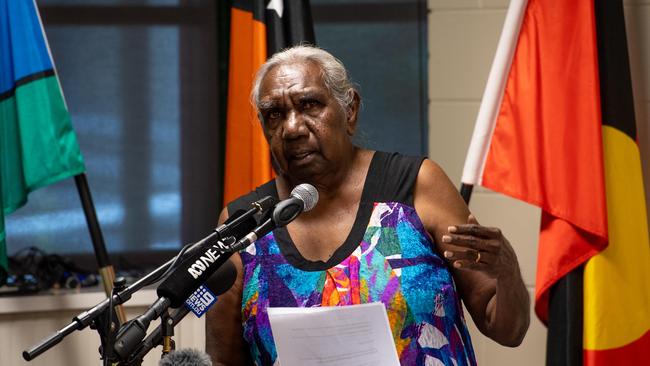
DR MIRIAM-ROSE UNGUNMERR BAUMANN
The amazing Indigenous elder, artist, activist, writer, public speaker and ground-breaking teacher Dr Miriam-Rose Ungunmerr Baumann was named Senior Australian of the Year.
In 1975, Dr Baumann became the Northern Territory’s first qualified Indigenous teacher and since then she has shown a relentless passion for improving Aboriginal rights and fighting for cultural independence.
“We learnt to speak your English fluently, walked on a one-way street to learn the white people’s way,” Dr Baumann said after accepting her award.
“Now is the time for you to come closer to understand us and to understand how we live and to listen to what needs are in our communities.”
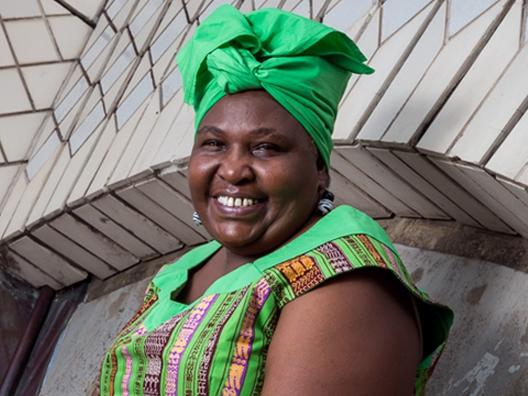
ROSEMARY KARIUKI
NSW’s Anti-violence fighter and advocate for migrant and refugee women, Rosemary Kariuki, was named the 2021 Local Hero at the Australia Day Awards.
Fleeing Kenya alone in 1999 to escape family abuse, her early years in Australia were lonely and fraught
Kariuki recognised that isolation was a huge issue for many migrant women – and she was inspired to act, coming up with ways to bridge connections across her community.
She started events like the African Women’s Dinner Dance, which has been held now for 14 years.
“I use friendly ways to reach and engage with women, like the Cultural Exchange Program where I take women to the countryside to exchange culture,” Kariuki said after winning her award.
“By the third day, they have made friends who share their issues, like domestic violence and lack of employment.”
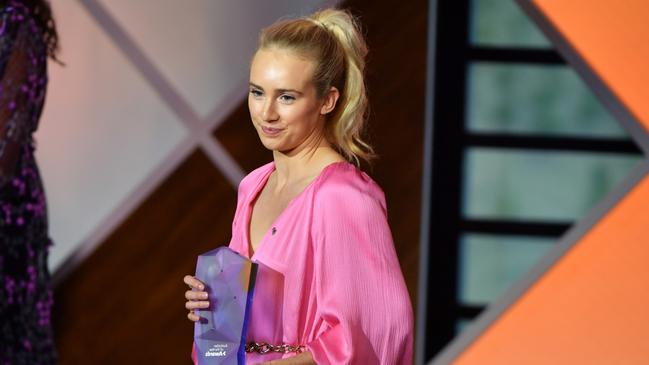
ISOBEL MARSHALL
Young Australian of the Year Isobel Marshall has been working to end menstrual stigma and period poverty for four years.
“Menstrual stigma needs to be addressed as a community and a movement of people who want to change the conversation, and make people feel more comfortable about this,” Marshall said.
“The natural biological function experienced by half the world’s population is still a major reason for inequality.
“Periods should not be a barrier to education.
“They should not cause shame, and menstrual products should be accessible and affordable. They are not a luxury or a choice.”
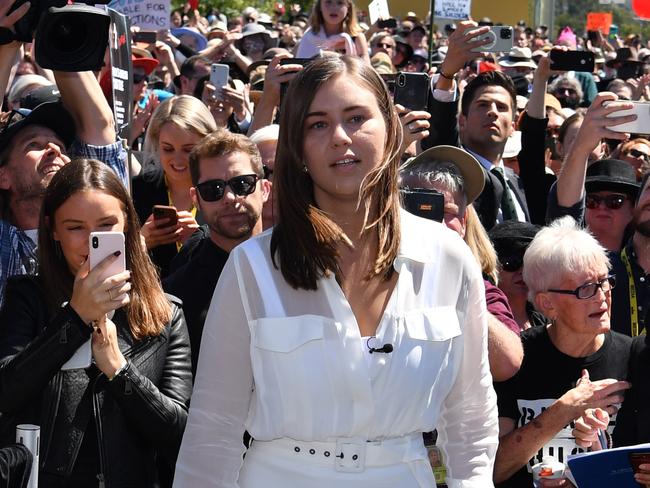
BRITTANY HIGGINS
Grace Tame’s powerhouse speech and advocacy to give survivors a voice had a massive domino effect, leading to women across Australia opening up about their experiences.
Former Federal Parliament staffer Brittany Higgins became one of the leading voices on the issue this year after coming forward with her story of alleged rape and the inadequacy of the Government’s response to those allegations.
The matter is before the courts, so it’s impossible for me to go into the details other than to say Higgins says she was raped by a colleague inside then-Defence Industry Minister Linda Reynolds’s office two years ago.
A man has been charged over the allegation and is yet to face trial. He denies the allegation.
There’s no doubt Higgins’ decision to voice her experience delivered a moment of reckoning for the nation and for political powerbrokers.
Higgins’ interviews with ground-breaking journalist Samantha Maiden for News Corp – publisher of this masthead – helped ensure hundreds of thousands of females from all walks of life would step out for the Women’s March 4 Justice rallies across the nation.
“We are all here today, not because we want to be here, because we have to be here,” she told marchers at the rally on the grounds of Parliament House in Canberra.
“We fundamentally recognise the system is broken, the glass ceiling is still in place and there are significant failings in the power structures within our institution.
“I came forward with my story to hopefully protect other women.”
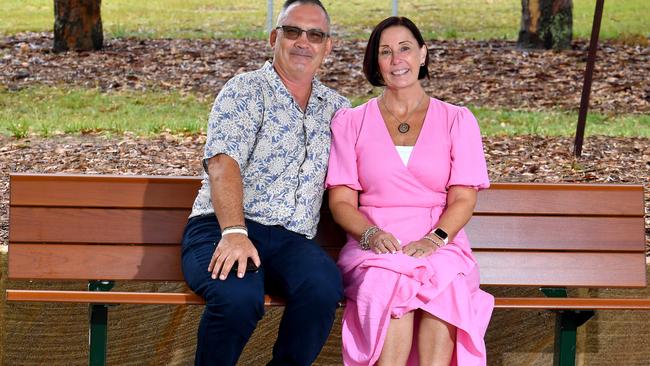
SUE CLARKE
In February of 2020, Sue Clarke’s daughter Hannah and her grandchildren Aaliyah, 6, Laianah, 4, and Trey, 3, were set on fire by Hannah’s former husband and the children’s father Rowan Baxter.
Baxter murdered Hannah and the children in a street in the Brisbane suburb of Camp Hill.
Sue could have retreated into obscurity to mourn the loss of her family but she – along with her husband Lloyd – used her grief to make the world a better place for other women experiencing domestic violence.
Sue and Lloyd started the Small Steps for Hannah Foundation.
Since losing her daughter and grandkids, Sue has been pushing for the Queensland Government – and other Australian jurisdictions - to introduce legislation making coercive control a criminal act.
Coercive control is characterised by emotional, mental and financial abuse, isolation, intimidation, sexual coercion and cyberstalking.
Sue’s advocacy and commitment to change is on the verge of fruition with the Queensland Government committing to introducing the legislation within four years.
“There’s a lot of humiliation and intimidation as well,” Sue told a media outlet after the government announced its intentions.
“They put it onto their partners, which then makes it hard for them to leave.
“Hannah found it very hard to leave, she tried three or four times in that last year - he convinced her she would be a bad mother if she left and that it was bad for the children, so very manipulative.
“It’s a pattern - and that’s the worst thing, it’s not physical, there’s no marks so it’s very hard to pick.”
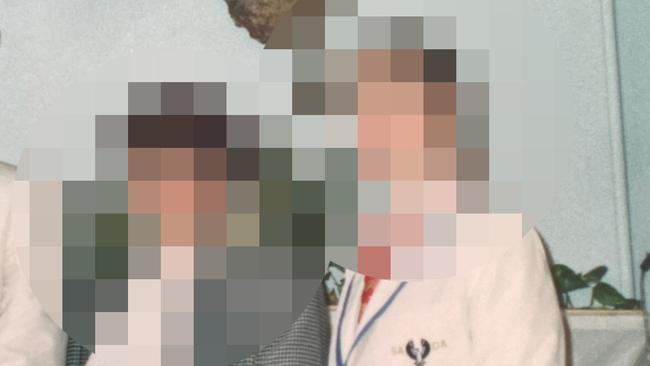
KATE
Kate is the woman who accused former Federal Attorney General Christian Porter of raping her when they were teenagers.
Porter denies the allegation.
Kate ended her own life in June of 2020 but before she died she compiled a dossier outlining her claim.
That dossier was sent to a number of people including Prime Minister Scott Morrison, Labour Senator Penny Wong and Sarah Hanson-Young.
The document became a matter of public record in 2021 as Porter sued the ABC for defamation.
Porter and the ABC reached a settlement and the MP is unlikely to have to defend himself in a criminal court as police closed the case due to not getting a statement from Kate.
However, Kate did give a statement to her lawyer in 2019.
“I was drunk, and I trusted him, so I agreed. I had no real reason then not to,” she said in the document.
“We went up to my room, and I let him inside.
“What did happen next was a total surprise to me.”
The inclusion of Kate on this list of women who roared will prove controversial, but it’s important to note that she had broad support from a number of people close to her and also from politicians like Wong and Hanson-Young.
That said, it must be stressed that Porter has vehemently denied the allegations.
As a result of the public discussions around the matter he has decided to not contest the next Federal election.
“It didn’t happen, and it’s not true,” Mr Porter said during a press conference earlier this year.
“No-one is beyond an allegation, no-one.
“If you could just imagine for just — and I know that we’re all cynics and this is a hard and tough and fast environment that we’re all in — but just imagine for a second that it’s not true, that for whatever reason the recollection and the belief, which I’m sure was strongly held, is just not true.”
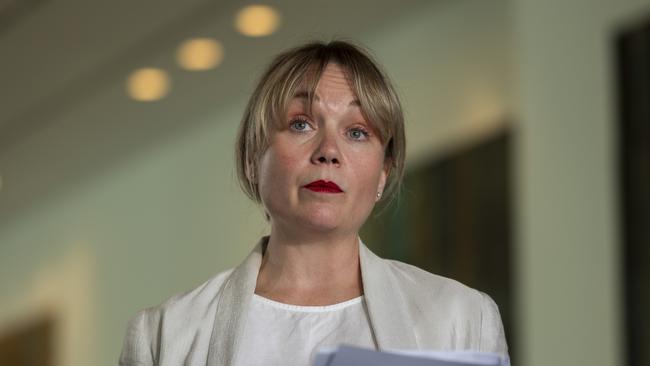
RACHELLE MILLER
FORMER Liberal staffer Rachelle Miller revealed a few weeks ago that her consensual “affair” with Federal Education Minister Allan Tudge was at times abusive.
Tudge has “completely and utterly” rejected the allegations but has acknowledged he was involved with Miller.
“It was about 4am and a morning media producer was calling about the front-page story, wanting to line up an interview with the minister,” Miller told journalists during a presser in Federal Parliament’s Mural Hall early this month.
“I felt someone kicking the side of my hip and leg as I tried to sit up in the bed.
“It was the minister. He was furious, telling me to ‘get the f*** out’ of his bed.
“I quickly told the producer I would call her back. I then realised I was completely naked.
“He continued to kick me until I fell off the side of the bed and ended up on the floor.
“I searched around in the dark for my clothes.
“He was yelling at me that my phone had woken him up. He needed to get more sleep.
“He told me to ‘get the f*** out’ of his room and make sure that no-one saw me.”
After Miller came forward, it became clear that Mr Morrison’s approach to these types of allegations had changed since Higgins spoke of her experience.
Mr Morrison’s chief of staff John Kunkel offered Miller support and Mr Morrison asked Tudge to stand aside pending an investigation.
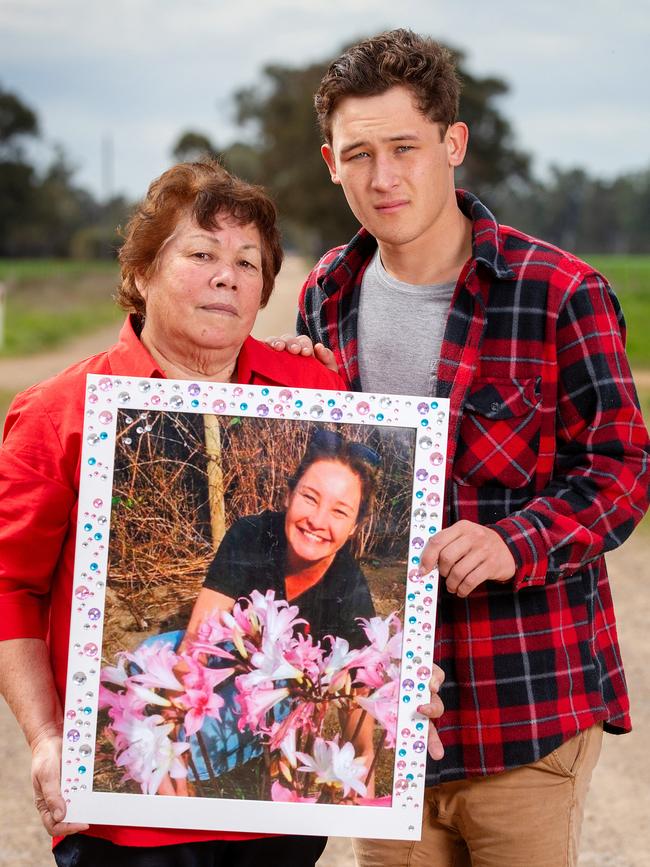
LEE LITTLE
LEE Little is far from a household name but the grandmother from Victoria has been a vocal anti-violence activist for four years.
On December 28, 2017, Lee’s daughter Alicia Little was killed by her partner Charles McKenzie Evans.
in the minutes before she died, Alicia called her mum, telling the older woman she feared for her life and that she planned that day to escape the man who had subjected her to ongoing abuse and violence.
Mrs Little heard Evans abusing Alicia as they spoke over the phone, saying he said: “Bring your brothers, bring your uncles. I don’t care. I’m a f***ing Evans and I’ll go through the lot of them.”
At the urging of her mum, Alicia phoned 000 to let authorities know she was in danger and that Evans was both ‘abusive and drunk’.
Minutes later Evans took her phone, got into his Toyota Hilux ute and drove at Alicia.
He crushed her between the vehicle and a water tank. He also ran over the top of her before fleeing the scene.
Police arrived 16 minutes later to find Alicia gravely injured. She could not be saved.
Initially charged with murder, Evans pleaded guilty to dangerous driving causing death and barely served three years in jail for the crime.
This was despite an ongoing history of domestic violence against Alicia and the fact that he killed her as she was leaving the relationship following another abusive episode.
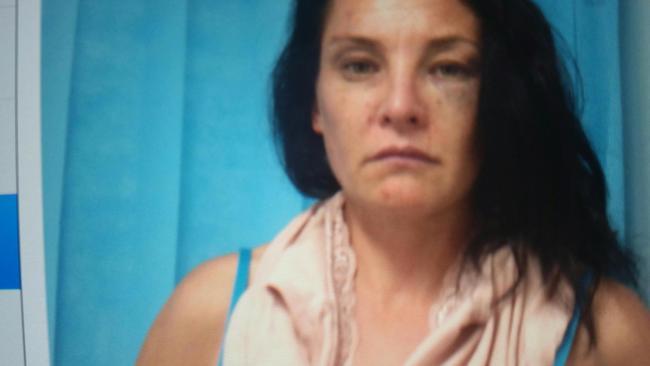
This year has been particularly hard for Mrs Little, with Evans being allowed to move to Queensland to live next door to Alicia’s family.
He’s also appeared on dating apps.
Mrs Little spoke to News Corp on December 14, saying she feared for her family.
“This man is dangerous,” Mr Little said.
“I worry that he is going to do this to another lady, another family.”
Putting her own fears aside, Mrs Little has been campaigning to change the law so domestic violence is a consideration when people are sentenced on lesser charges following a family abuse-related death.
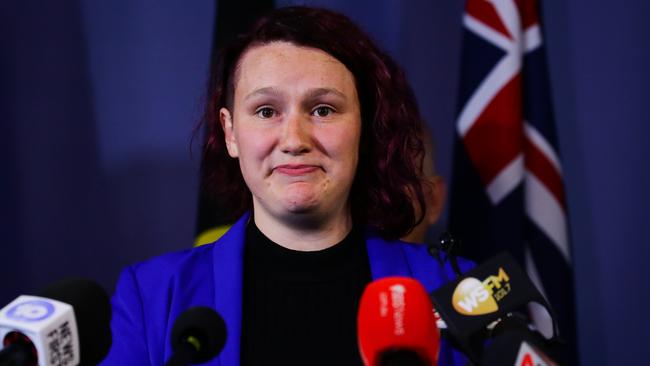
SAXON MULLINS
In 2013, 18-year-old Saxon Mullins was taken into an alley behind a Kings Cross nightclub where she claimed she was anally raped by the nightclub owner’s son Luke Lazarus.
What followed was more than four years of court hell for the young woman.
She says she did not consent to sex with Lazarus but he claimed otherwise.
Lazarus was initially found guilty of sexual intercourse without consent in 2015, but the NSW Court of Criminal Appeal overturned the verdict and ordered a retrial.
In 2017, a judge-only trial found Lazarus not guilty on the basis of a mistaken belief in consent based on ‘reasonable grounds’.
That ruling was overturned, but the Court of Criminal Appeal did not order a third trial because it would be “oppressive” for Lazarus.
In 2021, some eight years after the alleged assault, Mullins became the driving force behind a radical overhaul of NSW’s sexual consent laws.
The new laws mean people have to say or do something to confirm their partner consents to a sexual activity, otherwise they could be found guilty of sexual assault.
After the laws were passed Attorney-General Mark Speakman paid tribute to Mullins’ “extraordinary bravery” and “tireless advocacy”.
“It does feel nice, on one hand,” Mullins, who is the director of advocacy at Rape and Sexual Assault Research and Advocacy (RASARA), said.
“I would never have dreamed that something like this could happen.
“Then on the other hand, obviously I wish nobody in Australia knew my name.
“If we just change the law nothing’s actually going to change.
“We need to have those community attitudes change as well, and so everything that goes along with it is so, so important.”
All NSW judges, lawyers and police will be educated on the legislation before it comes into effect in 2022.
There will be new directions for juries in rape and sex assault trials to address common misconceptions in these cases.
The NSW Government will also roll out awareness campaigns and undertake research into the experiences of survivors who have been through the criminal justice process.
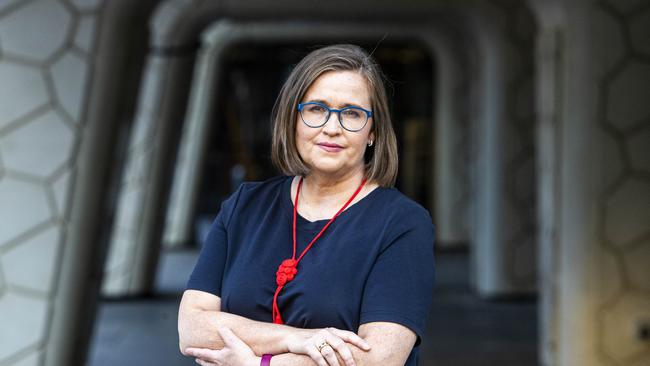
KATE JENKINS
Kate Jenkins has possibly one of the hardest jobs in Australia - advancing gender equality and ending all forms of discrimination against women. This is the basic remit of her role as the nation’s Sex Discrimination Commissioner.
Just three weeks ago, Jenkins released Set the Standard: The Australian Human Rights Commission’s Report on the Independent Review into Commonwealth Parliamentary Workplaces.
The paper followed seven months of engaging with current and former staff and MPs.
The review should be considered a wake-up call for those at the forefront of our Federal Parliament after it highlighted how endemic bullying, sexual harassment and assault, gender inequality and power imbalances are in our nation’s highest office.
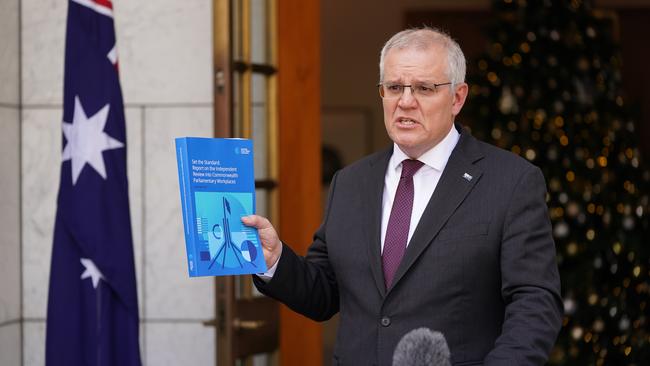
The report shows that 51 percent of people working in parliament had experienced at least one incident of bullying, sexual harassment or sexual assault.
A further 77% had experienced, witnessed or heard about this type of behaviour.
Jenkins made 28 recommendations designed to bring parliament into line with the standards expected of all workplaces.
“A lack of clear standards of conduct, limited accountability and power imbalances, combine with the high intensity, high stakes nature of the work, the pursuit of political power and advantage, the frequent blurring of personal and professional life and the intense loyalty to political parties to create specific risk factors unique to this workplace,” Jenkins said.
*For 24-hour domestic violence support call the national hotline 1800RESPECT on 1800 737 732 or MensLine on 1800 600 636. The Suicide Call Back service is on 1300 659 467.
News Corp’s Sherele Moody has multiple journalism excellence awards for her work highlighting violence in Australia. Sherele is also an Our Watch fellow, the founder of The RED HEART Campaign and the creator of the Australian Femicide & Child Death Map and All That Remains: The Memorial to Women and Children Lost to Violence.
Continue the conversation:
TWITTER: @Sherelemoody
FACEBOOK: https://www.facebook.com/sherele.moody/




